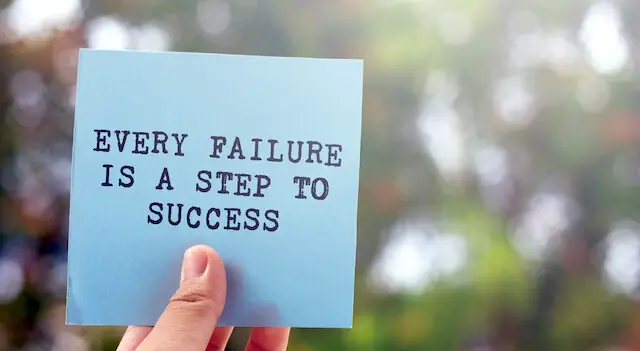Far as I can tell, we’ve all been there at least once in our lives.
You had a goal…a dream…a prayer…something you really, REALLY wanted. Maybe it was that dream job, a big contract, or high-profile project.
You really believed it could happen…that you could make it happen. You worked really hard, put your heart and soul into it. Maybe you even stayed up late and cut out time with friends and family. But that was ok because you really wanted to do this thing and get it right.
So, you gave it everything you’ve got…
And then something happened. Maybe you saw it coming, maybe you didn’t. Maybe there was one big catastrophic breakdown or maybe things fell apart slowly as you struggled progressively harder to hold it all together.
Either way, your big goal — your big dream – came crashing down.
I’m not talking about some little B.S project that went off the rails.
This was your DREAM!
Something you really had your heart set on…and now it’s just one big stinking pile of excrement.
And ever since then, if you’re being really honest, you refuse to EVER let yourself REALLY go for something. You won’t let yourself put 100% of your enthusiasm, energy, and heart into it…especially if it seems like the thing that destroyed your dream was completely outside of your control.
Shaking off or getting over a goal trauma — that’s what this is BTW, yes, it does have an actual name — is not something to be taken lightly.
The longer-term implications of getting stuck with a goal trauma can be like a dark cloud that hangs over anything you set out to do. It causes you to hesitate, hold yourself back, and down-size any new dream, goal, or opportunity that comes across your radar. It can even cause you to refuse to set any goals at all! At least that way you can’t be disappointed again, right?
So how do you “get over” a goal trauma?
The specific process is different for everyone because the elements that led to the breakdown are different for everyone…
BUT, here are some tips to get you started:
1. Take an honest look at yourself. What are your strengths, weaknesses, skills? How did those impact the situation?
2. Step up your self-care. Major breakdowns — you might even call them failures — are physically and emotionally taxing. Support yourself with good basics: healthy food, fresh air, physical movement, clean water, and good sleep.
3. Engage your curiosity. What went right? When did you notice something was off? What could you have done better? What worked really well?
4. Focus more on what you want, and less on what you don’t. In the aftermath of the breakdown, lean in to the things that light you up.
5. Work on your thoughts. Challenge yourself to find the good, the silver lining, in the mess. (What new capacity or strength do you now have as a result of this?)
6. Create your own rite of passage. In this breakdown, there was a LOSS…something died…your dream, your goal, your hope, whatever. Honor that loss so you can close the loop and start again.
7. Find support. The lasting impact of a goal trauma — especially one where you find yourself saying “I tried my best and my best wasn’t good enough” — impacts family, friends, and professional colleagues so seek support outside those circles.
The truth is disappointments, setbacks, and failures are facts of leadership growth. It’s actually part of the process. That’s why knowing specifically what you need to reconstitute yourself after a breakdown, AND actively seeking that out is critical to keeping you in the game long enough to make the difference you’re here to make.
Don’t let the dark cloud of an old goal trauma shut you down.
Now, more than ever, the world needs who you were meant to be.
At Greatness In Government we show leaders, especially those in government, struggling with burnout, career stagnation, and “Walking Dead Syndrome” how to access greater bandwidth, make a bigger impact, and enjoy more personal satisfaction in their lives both inside and outside the office.


